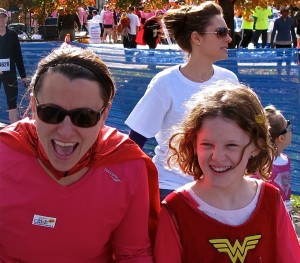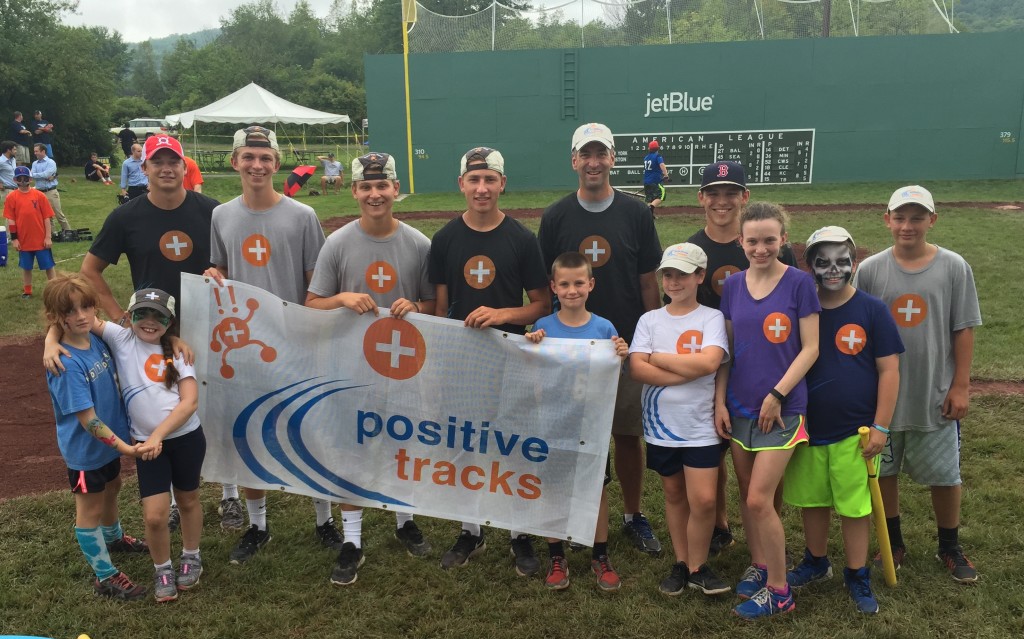Every year in mid August my family and I travel to Vermont to participate in the Travis Roy Foundation Wiffle Ball Tournament. The Tournament is the largest fundraiser for the Foundation. Travis’ story is well known in Boston and beyond. The Foundation was created after his spinal cord injury in his first collegiate game at Boston University. It now supports individuals living with spinal cord injury as well as spinal cord injury research.
Billed as the “best weekend of the year,” it’s a natural family event for us. I work in the field of philanthropy, spending my days advising donors, helping them match their passion for a cause or an issue with the resources they have for charitable giving. Our firm provides administrative support and strategic guidance to the Travis Roy Foundation. My kids are both athletes and I spend many a night and weekend on a baseball diamond or soccer pitch. I welcome opportunities to connect with my kids and teach them that there’s a whole world out there about which they can learn and to which they can offer their talents for good. If you are reading this, chances are that giving back is really important to you, too.
What struck me most about the weekend’s festivities wasn’t the amount of money that was raised–although that was significant. This year’s event raised over $600,000, the most for a single year, and the cumulative total for the event is more than $4 million, which helps fund the Foundation’s grants to individuals and for research. Much of that money came from $20 and $30 contributions solicited by the players, many of whom were under age 23 thanks to a partnership with Positive Tracks. Nor was the most striking takeaway the magic of Little Fenway, Little Wrigley, and Little Field of Dreams, which take your breath away when you turn off a simple country road in Essex, Vermont and find them in Pat O’Connor’s back yard.
The most significant concept that came through over and over this weekend was the effect of the inspiration, the myriad one time strangers coming together and forming an instant community, trying to create miracles while playing a game of adolescence. A volunteer team puts on the whole event, and dozens of committed individuals give of themselves nearly year round to make the tournament happen (they are probably organizing for next year as I write this). As a result of their efforts, and Travis’ example, hundreds of people gather from all over the Northeast, and from across the country, bringing with them good cheer and a competitive edge. They find a common purpose in doing something for others, and receive just as much in return in the form of camaraderie and satisfaction.
Travis himself spoke from the field during the annual “money count.” He thanked those assembled, saying that they were “fueling the hope” that he and others in this shared community would some day see an end to paralysis. During private talks with each team, Travis offered his support back to the players, whether for a speaking engagement during the year, advice on college applications or even a simple email or phone call to talk something over. Will Reeve, son of Christopher and Dana Reeve and a board member of the foundation they created to accelerate spinal cord injury research, talked about the importance of what happens at that field, and of how victims and families support one another, lending strength to each other to continue the fight. “By being here you are answering the call. We like to talk about standing up for those who can’t, that’s what you’re doing by being here.”
Wiffle ball players were there for the Foundation and the spinal cord injury community, and vice versa. Reciprocal support, giving and receiving, plus a field of dreams, are truly the magic that comes off that field in Essex every year.
 This post, by Gioia Perugini, originally appeared on the Hemenway & Barnes blog. Gioia is the Associate Director for Philanthropy Services at Hemenway & Barnes, a Positive Tracks Board Member and a parent of two.
This post, by Gioia Perugini, originally appeared on the Hemenway & Barnes blog. Gioia is the Associate Director for Philanthropy Services at Hemenway & Barnes, a Positive Tracks Board Member and a parent of two.
Find Gioia on Twitter.
